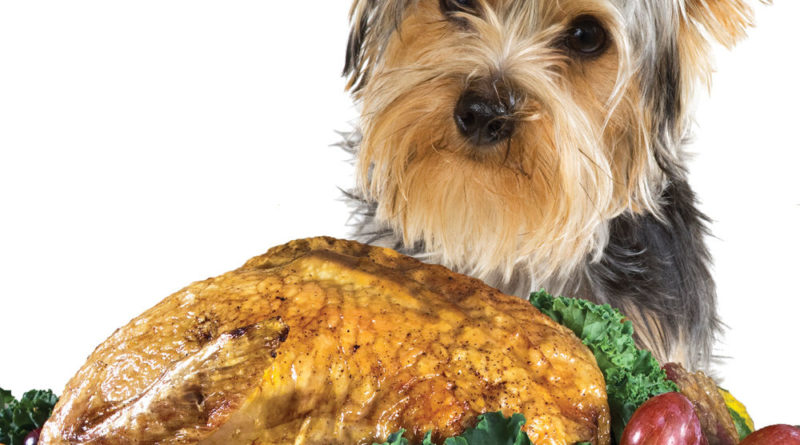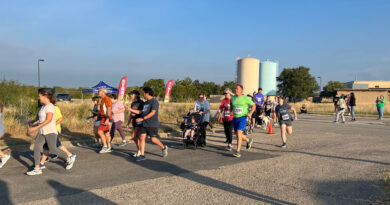Keeping fur kids safe from the temptations of holiday food
Story by CATHERINE HOSMAN
Photo illustration by M. CLARE HAEFNER
As the holiday season approaches and the fragrance of those once-a-year meals wafts out of the kitchen and through the home, keep pets in mind when it comes to setting out the food.
Dr. Rachel Ramesar, of Pet Medical Center in Harker Heights, said too often pets are brought in to the clinic with symptoms from too much holiday munching on foods they shouldn’t have. She said pet parents bring their pets in after the holidays with symptoms that may start out with something as simple as an upset stomach. However, depending on the amount of food they ate and the type, pancreatitis can develop.
“If they get a hold of food they are not used to, especially fatty foods (such as ham or turkey), it causes their pancreas to become inflamed and it can be life threatening,” she said.
“Also, don’t feed your dogs cooked turkey bones because they could perforate the intestines,” she said.
Foods toxic to pets include chocolate, grapes and raisins that could cause kidney failure in dogs. “That could be as little as one or two grapes or raisins to set off a reaction in some dogs,” she said. If your dog has gotten into the chocolate, call a pet poison control center or the local vet emergency clinic.”
If your pet kids are of the feline species, Ramesar said she doesn’t see as many food issues with cats as far as food. The big danger for cats is plant toxicity.
“Poinsettias are a big deal and are renal toxic and can cause upset stomach and diarrhea,” she said. “Mistletoe is toxic to cats and dogs and, depending on the dosage they get, the effect could be from mild, to seizures and death.”
“A lot of the stuff they eat can be toxic,” she said. “If we can get them to throw it up in 30 minutes to two hours, which is the longest time we can wait, we could fix the whole problem right there. But if they wait around, it’s too late and it could become life-threatening.”
As far as eating something really fatty, there is not too much you can do but keep an eye on them or talk to a vet.
There aren’t any great home remedies, Ramesar said, but in some cases, and only under the direction of a veterinarian, hydrogen peroxide can induce vomiting.
“The best thing to do in any emergency pet situation is to get your pet to an emergency clinic or your vet’s office where they have medication that can help your pet, in a controlled environment.”
Safety tips
To keep your pet safe at the holidays, Dr. Ramesar recommends the following:
1. Don’t feed dogs or cats anything abnormal. Keep them on their regular diet.
“Veggies like carrots, green beans, or peas are safe. Apple slices are OK, but not the seeds. No onion or garlic. Most of the fruits and veggies are pretty safe and won’t upset their stomach.”
2. Don’t feed them anything fatty.
3. Never give your pets chocolate and don’t put a bowl of chocolate on the coffee table that they can easily reach.
4. Don’t feed your pets turkey bones, they can shatter.
5. Be aware of where your pet is and where the food is set out so we don’t have to see your pet for some of these food-related reasons.
6. Keep all medications out of your pet’s reach.
7. Don’t wait. If your pet has gotten into some of the holiday goodies, the sooner you address it the more successful treatment will be.
8. Don’t give pets as Christmas gifts.
“A lot of people like to get a puppy for their kids for Christmas. Pets are not a possession, a toy, it is a responsibility,” she said. “The whole family should prepare to make a decision about a pet.”
Ramesar said puppies are a lot of fun at the holidays, but later when they are chewing up the house, she sees a lot of them showing up in shelters.
“Six months to a year after the puppy was given as a gift, it ends up in a shelter because people realize how much responsibility it is to have a pet. This can be avoided if you make a group decision before bringing another family member into your home. A pet is not just a gift.”
Animal Emergency
Center of Temple-Belton
3809 S. General Bruce Drive #108, Temple
Phone: 254-231-3774
Clinic@tembelanimalemergency.com
Hours: Monday-Saturday 6 to 8 p.m.
Saturday noon to Monday 8 a.m.
Open all holidays.
After Hours Veterinary Services
2501 S. W S Young Drive # 109,
Killeen, TX 76542
Phone: 254-628-5017
Hours: Monday through Friday,
6 p.m. to 8 a.m.
Closed Saturday and Sunday
In an Emergency…
If your pet does eat something he or she shouldn’t, time is critical. Call your veterinarian or a pet poison hotline immediately and be prepared to describe the following:
• What your pet ate
• How long ago
• How much
The ASPCA Animal Poison Control Center’s hotline number is 888-426-4435. The Pet Poison Helpline number is 800-213-6680. (Note: Callers will be charged a consultation fee.) If possible, bring some of the substance, including any available packaging, with you if you are asked to bring your pet in for an examination.
Top 10 Pet Poisons
The ASPCA Animal Poison Control Center handles more than 100,000 cases of pet poisonings every year. Based on those cases, the top offenders are:
• Human medicines
• Insecticides
• Human food
• Rodenticides
• Veterinary medicines that are given incorrectly (e.g., wrong medicine, wrong amount)
• Plants
• Chemicals (e.g., antifreeze, pool/spa chemicals)
• Household cleaners (e.g., bleach, detergent)
• Heavy metals (e.g., lead paint chips, linoleum)
• Fertilizer
The ASPCA Animal Poison Control Center’s hotline number is 888-426-4435. The Pet Poison Helpline number is 800-213-6680. (Note: Callers will be charged a consultation fee of $49.)
https://www.vetsecure.com/bellcountyanimalclinic/articles/72



